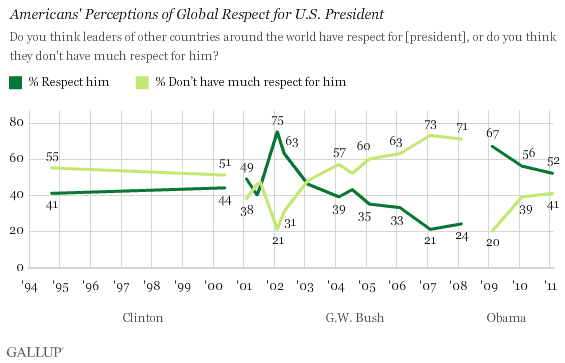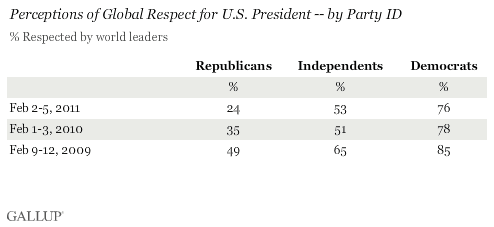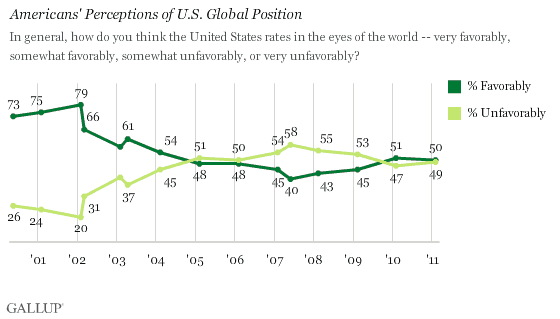PRINCETON, NJ -- Although a majority of Americans (52%) continue to say foreign leaders respect President Barack Obama, this is down from 2010 and 2009. However, Obama's current position on this measure is more positive than was the case during most of the terms of Presidents George W. Bush and Bill Clinton.

In February 2009, shortly after Obama's presidential inauguration, a soaring 67% of Americans perceived that the world's leaders respected him. That dropped to 56% last February, and is slightly lower (52%) in this year's Feb. 2-5 Gallup World Affairs survey.
Still, Obama's readings on this measure remain historically high.
A few months after 9/11, Bush received 75% and 63% readings on this respect question -- but all other readings during the Bush administration were below 50%. That includes the low point in February 2007, when 21% of Americans said world leaders respected Bush. Americans' views of world leaders' respect for Obama are also higher than two Gallup measures for Clinton, in 1994 (41%) and 2000 (44%).
Republicans Less Positive Than in 2009 About World Leaders' Respect for Obama
Predictably, Democrats (76%) are far more likely than Republicans (24%) to say world leaders respect Obama. The decline in Obama's overall ratings on this measure in the last three years is mainly the result of Republicans' changing views, which are about half as positive now as they were in 2009.

Half of Americans Say the World Views the U.S. Favorably
Americans remain slightly more positive than negative when asked their views of the image of the U.S. in the eyes of the world, with 50% holding the belief that the U.S. is seen favorably and 49% unfavorably. This is similar to last year, but more positive than in 2005-2009, when less than half of Americans thought the U.S. was seen favorably.
Prior to 2005, Americans were more positive. Almost three-quarters said the world viewed the U.S. favorably in 2000, and 79% said the same in February 2002. Positive views of the United States' image drifted downward from that point. Much of the decline in Americans' views of the U.S. image around the world coincided with international controversy over the Iraq war.

Sixty percent of Democrats say the U.S. is viewed favorably around the world, compared with 45% of Republicans and 46% of independents.
Bottom Line
Americans' perceptions of how world leaders view President Obama remain in positive territory, but have grown somewhat less so in the two years since he took office. This tracks with Obama's approval rating, which has gone from the mid-60% range in February 2009 to the high 40% range today.
This year's measure is from Gallup's Feb. 2-5 World Affairs survey, conducted shortly after the turmoil in Egypt began to dominate international news. Mid-February Gallup polling shows that Americans highly approve of Obama's handling of the Egyptian situation, so views of his standing in the eyes of world leaders could have changed since the early February survey.
Regardless, more Americans now say world leaders respect President Obama than said that about Bush at most points in his administration, or about Clinton.
Americans are also more positive about the world's image of the United States than they were in the last years of the Bush administration. They are, however, less positive than they were in 2000 -- Bill Clinton's last year in office -- through 2004. The decline in Americans' perceptions of the U.S. image beginning in the middle of the last decade was arguably due to the impact of U.S. involvement in Iraq. It remains to be seen what influence the current Egyptian crisis -- and the U.S. response thereto -- may have on these perceptions going forward.
Survey Methods
Results for this Gallup poll are based on telephone interviews conducted Feb. 2-5, 2011, with a random sample of 1,015 adults, aged 18 and older, living in the continental U.S., selected using random-digit-dial sampling.
For results based on the total sample of national adults, one can say with 95% confidence that the maximum margin of sampling error is ±4 percentage points.
Interviews are conducted with respondents on landline telephones (for respondents with a landline telephone) and cellular phones (for respondents who are cell phone-only). Each sample includes a minimum quota of 150 cell phone-only respondents and 850 landline respondents, with additional minimum quotas among landline respondents for gender within region. Landline respondents are chosen at random within each household on the basis of which member had the most recent birthday.
Samples are weighted by gender, age, race, education, region, and phone lines. Demographic weighting targets are based on the March 2010 Current Population Survey figures for the aged 18 and older non-institutionalized population living in continental U.S. telephone households. All reported margins of sampling error include the computed design effects for weighting and sample design.
In addition to sampling error, question wording and practical difficulties in conducting surveys can introduce error or bias into the findings of public opinion polls.
View methodology, full question results, and trend data.
For more details on Gallup's polling methodology, visit www.gallup.com.
